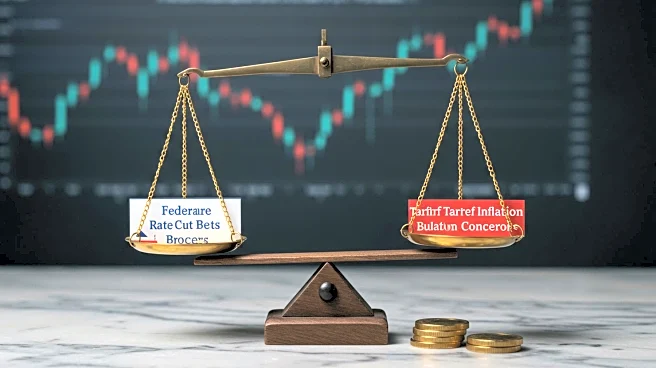What's Happening?
A recent Reuters survey of bond strategists indicates that longer-term U.S. Treasury yields are expected to rise modestly in the coming months due to concerns over tariff inflation and a significant increase in new debt issuance. This development comes as short-term yields are anticipated to fall, driven by renewed bets on Federal Reserve rate cuts. The survey highlights that both two-year and 10-year yields have decreased by approximately 25 basis points since mid-July, despite the expectation of nearly half a trillion dollars in new Treasury securities entering the market this quarter. The decline in yields followed downward revisions to previous hiring data, which led President Trump to dismiss the Bureau of Labor Statistics commissioner. A September rate reduction by the Federal Reserve is now considered almost certain, with additional cuts anticipated by year-end due to concerns about the job market and potential political interference in Fed policy.
Why It's Important?
The anticipated changes in U.S. Treasury yields have significant implications for the broader economy and financial markets. Rising longer-term yields could reflect increased fiscal concerns and the need for higher compensation to attract buyers for the growing Treasury debt. This situation may lead to a steeper yield curve, which could impact borrowing costs and investment strategies. Additionally, the potential rate cuts by the Federal Reserve signal an easing bias, which could influence economic growth and inflation expectations. The ongoing tariff inflation concerns add complexity to the Fed's ability to manage monetary policy effectively, as inflation remains above the target rate. These dynamics could affect various stakeholders, including investors, businesses, and policymakers, as they navigate the evolving economic landscape.
What's Next?
The upcoming consumer price index (CPI) data release is expected to show a further rise in inflation, which could influence future monetary policy decisions. Market participants will closely monitor the Federal Reserve's actions and statements regarding rate cuts and inflation management. The large Treasury debt sales anticipated in the coming quarters may continue to exert upward pressure on long-term yields, necessitating strategic adjustments by investors and financial institutions. Additionally, the ongoing debate over the central bank's independence and the credibility of U.S. statistics may shape future policy discussions and economic forecasts.
Beyond the Headlines
The broader implications of these developments include potential shifts in investor confidence and market stability. The interplay between fiscal policy, trade concerns, and monetary policy could lead to long-term changes in economic growth patterns and investment strategies. The credibility of official statistics and the independence of the Federal Reserve are critical factors that may influence public trust and policy effectiveness. As these issues unfold, stakeholders will need to consider the ethical and strategic dimensions of economic decision-making.









